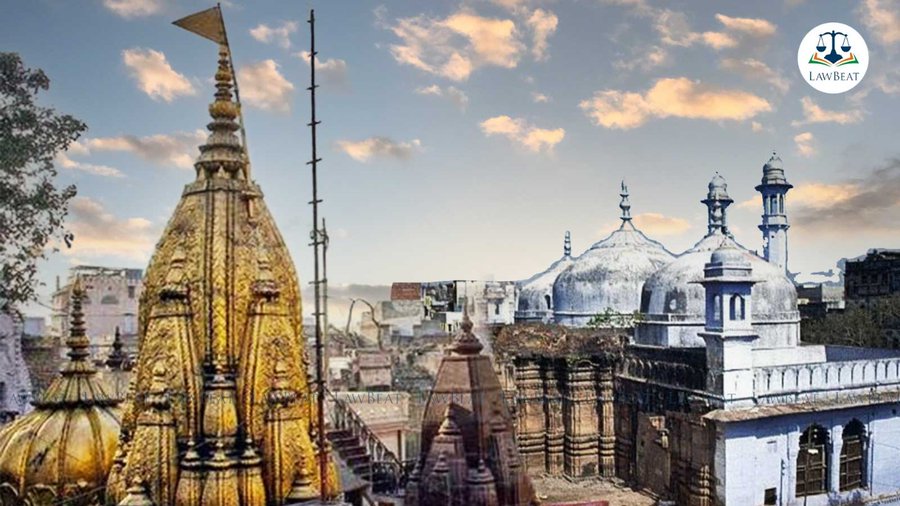Kashi Vishwanath-Gyanvapi dispute case(s)| Sunni Waqf Board illegally & arbitrarily registered temple's property: Adv. Rastogi argues before Allahabad High Court

In the ongoing hearing before the Allahabad High Court in case(s) related to the Kashi Vishwanath temple-Gyanvapi mosque dispute of Varanasi, Adv. Vijay Shankar Rastogi, the appointed next friend of Lord Vishweshwar, today argued that the Sunni Waqf Board had illegally and arbitrarily registered the property of the temple as Waqf's property, hence it is void.
Before the bench of Justice Prakash Padia, Adv. Rastogi submitted that neither the temple nor the Lord Vishweshwar, the self-manifested diety, had ever been served any notice before Waqf Board's declaration that the property in question is Waqf property.
"In 'absence' of such notice, the Waqf Act will not be applicable to the other party, Rastogi argued.
Rastogi further referred to the Top Court's ruling in Ramesh Gobindram (dead) through Lrs. v. Sugra Humayun Mirza Wakf (2008) where the provisions of Section 6 of the Waqf Act, 1954 were clarified.
He pointed out that as per the Explanation under Section 6 (1) of the Act, the term "any person interested therein", includes a person to whom a reasonable opportunity had been afforded to represent his case by notice served on him.
Rastogi also referred to Section 54 of the Act which states that for removal of encroachment from wakf property, the Chief Executive Officer shall cause to be served upon the encroacher a notice specifying the particulars of the encroachment and calling upon him to show cause.
In view of both the provisions, Rastogi argued, "How can the property of a person who does not have an interest in Waqf or is not benefited from Waqf be attached?"
To further press his argument, Rastogi referred to Section 5 of the Wakf Act, 1995 - Publication of list of waqfs. Rastogi submitted that as per this provision also, even if the property in question was registered as waqf's property, it was required to be re-registered.
Rastogi averred that there is no document on record to show the registration of the property as Waqf. To this, Sr. Adv. Chaturvedi for the State Govt also submitted the property was not registered as is being claimed.
Furthermore, Rastogi submitted, "Some people call the disputed property a mosque, some people call it a temple, how will it be decided?? The religious character of the property will be considered for this."
Rastogi's this submission was in furtherance of his earlier argument that the religious character of the land in question was never changed as the property in question, i.e. the temple of Lord Visheshwar has been in existence from ancient time, i.e., Satyug up till now and the Swayambhu Lord Visheshwar is situated in the disputed structure.
Lastly, referring to the lower court's decision in the appeal filed in 1937 by one Deen Mohammad against the final order in Civil Suit No. 62 of 1936 which was dismissed by the High Court in 1942, Rastogi said, "If you look at all the evidence and facts, then Gyanvapi Masjid is surrounded by boundary wall on all sides which is much older than the Masjid, it is part of boundary wall of the temple."
In 1936, Deen Mohammad had filed a suit (Civil Suit No. 62) before a Varanasi Court for granting declaration that the disputed land was Waqf without impleading any member of the Hindu community. Mohd. had sought the declaration that he and other Muslims had the right to say their prayers specially Alvida prayers and to exercise other religious and legal rights on the property in question.
However, the trial court in the judgment has held that: “It appears from the orders that the shrine of Gauri Ji has been recognized to the West since long, that there was the deity of Bir Bhadeshwar to the North East in 1843 (Eighteen hundred Forty-Three), that there is the place of Abhi Mukteshwar to the North recognized in 1899 (Eighteen Ninety-Nine)…..”
The matter has been adjourned till May 9th for further hearing.
Case Title: Anjuman Intezamiya Masajid Varanasi v. Ancient Idol Of Swayambhu Lord Vishweshwar And 5 Others and connected matters
